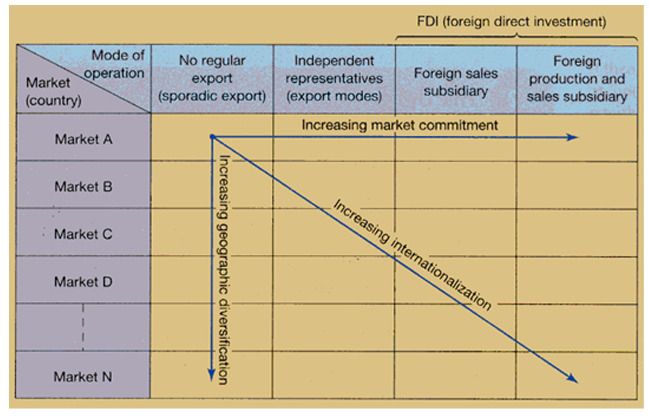Culture plays an important role in life of people as it is closely associated with them. It is very necessary to understand what a culture requires and what emotions are attached to it. Different countries follow different culture and because of this some things will be acceptable in some countries whereas the same things will appear to be rude in other countries because of culture difference. People who are culture sensitive will know that the difference between the culture of different people can create differences in their relationship with respect to the way they behave, communicate etc. Hofstede defined culture as “the manner in which the mind is programmed such that it can differentiate the people of one category with those of other.” a culturally sensitive person should try to adapt the culture of other country, their traditions, their way of living, their lifestyle etc. Nowadays people are getting closer Continue reading
International Business Management
Internationalization Concept -The Uppsala Internationalization Model
Internationalization consists of standardized products or service through globally standardized marketing and production processes that target standardized customer needs. Internationalization can be described as the process of increasing involvement in international operations. Another definition denotes internationalization as the process of adapting firms’ operations (strategy, structure, resources, etc) to international environments. Both definitions emphasize the crucial fact that internationalization needs an overall support from the organisation as it is changing the environment to expand in various manners the process mostly consists of macro factors to evolve. The Process of Internationalization Internationalization fundamentally alters the price-setting strategies of domestic economic agents. This is true for agents operating in product markets, factor markets and financial markets. At a micro level, internationalization directly alters pricing behavior by deepening product and factor markets. More potential buyers and sellers imply greater competition and a reduction in excess returns. At a macro level, internationalization also has the Continue reading
Global Supply Chain Management – Drivers and Activities of Global Supply Chain
Nowadays with globalization, global supply chain management is becoming a very important issue for most of businesses. The main reasons of this trend are procurement cost reduction, purchasing risks control, revenues increasing and etc. For instance, companies may set up overseas factories to benefit from tariff and trade concessions, lower labor cost, capital subsidies, and reduced logistics costs in foreign markets. Moreover, easy access to abroad markets and close proximity to customers result better organizational learning. On the other hand, improved reliability can be obtained as a consequence of closer relationship with suppliers. There are some issues that should be considered in managing a global supply chain. First of all, the company should decide about its general outsourcing plan. For whatever reason, businesses may prefer to keep some aspects of supply chain nearer to home. The second issue that must be incorporated into a global supply chain management strategy is Continue reading
Glocalization – Definition, Advantages and Disadvantages
Globalization is one of the most important phenomena of the recent past and of the future. The term “Globalization” describes an ongoing process by which regional economies, societies and cultures are becoming more integrated through a dramatically increased global network of technological, economic, political and cultural exchanges. In specifically economic contexts, the term refers to the integration of national economies into the international economy through trade, particularly trade liberalization or free trade, foreign direct investment, capital flows, migration and the spread of technology. This worldwide phenomenon of interaction among the countries is driven largely by advances in communication, transportation and legal infrastructure as well as the political choice of countries to open cross-border links in international trade and finance. Due to many difficulties that a globalization strategy faces another term has developed in recent years called “Glocalization”. In contrast to globalization, the glocalization strategy, which means thinking globally but acting Continue reading
Push and Pull Factors in International Business
Companies decide to go global and enter international markets for a variety of reasons, and these different objectives at the time of entry should produce different strategies, performance goals, and even forms of market participation. However, companies often follow a standard market entry and development strategy. The most common is sometimes referred to as the “increasing commitment” method of market development, in which market entry is done via an independent local partner. As business and confidence grows, a switch to a directly controlled subsidiary is often enacted. This internationalization approach results from a desire to build a business in the country-market as quickly as possible and by an initial desire to minimize risk coupled with the need to learn about the country and market from a low base of knowledge. International markets evolve rapidly and very often companies struggle to keep up in terms of their strategy. It is therefore Continue reading
The Advantages and Disadvantages of Globalization
Globalization has become a hot-debated issue in the last ten to twenty years. Globalization is affecting the world from different perspectives, such as political perspective, economic perspective, and cultural perspective. Currently, whether globalization can bring more positive effects or negative effects to the modern world is still open to debate. Different scholars around the world hold distinctive views regarding the definition of globalization, but in this article, the following two definitions are used. Globalization refers to the creation and intensification of global linkages. In addition, globalization also refers to the compression of the world and the intensification of consciousness of the world as a whole. One of the main ideas of globalization is to break the barriers between countries. Everyone can receive information about different events happening in the world instantly. In the era of globalization, breaking barriers between countries is inevitable. Trading, foreign investments, population movements, these activities across Continue reading




